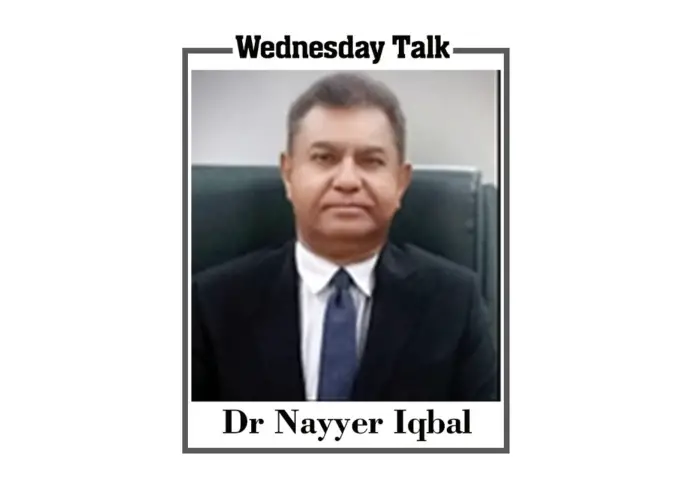Faiz Ahmad Faiz passed away on November 20 1984. Leaving apart the left-right ideological divide, he was undeniably the greatest Urdu poet of the twentieth century after Iqbal. In the post-renaissance period, it has become a trend to categorize the intellectuals according to their respective schools of thought. In order to understand their philosophy this type of classification may be helpful however to ascertain someone’s literary or cognitive stature, it can’t become a basis. The analysts ought to evaluate the intellectuals objectively rising above their denominations. Despite having a different perception of life and its issues Faiz admitted Iqbal’s immenseness and the lasting intensity of his message. The poem titled ‘Iqbal’ is part of ‘Naqsh-e-Faraydi’.
Faiz was a poet by nature. The maturity and sophistication of his college-days romantic poetry which forms the first half of ‘Naqsh-e-Faraydi’ amazes the reader. Later, his ideas evolved and he became convinced of ‘Adab barae muqsud’ which radically transformed the nature of his poetry. ‘Mujh se pehli si muhabbat meray mehboob na mang’ was actually a pronouncement of this change. ‘Raqeeb se’ and Mozu-e-sukhan’ are also important in this regard. Various descriptions and interviews of Faiz himself and numerous writings particularly that of Ayyub Mirza and Mirza Zafar-ul-hassan explain the transmuting steps towards this shift in approach. It is also noticeable that he was appointed as first Secretary of ‘Progressive Writers Movement’ (PWM) at the young age of 25 in 1936 despite the presence of much-senior anti-right literary figures. This literary movement later contributed hugely towards growth of Urdu literature and made it purposeful which hitherto lacked this element to a great extent. It needs to be added here that Fiaz had already become a regular member of the Communist Party during his final years of education on the persuasion of M. N. Roy and Muzaffar Ahmad, the two great revolutionaries of the time. The close association with the left-oriented luminaries of politics and literature further hardened his disliking for colonialism, dictatorship, tyranny and multifarious types of exploitation. During this phase of life apart from his literary contribution he practically worked as well in capacity of a trade-unionist.
After ‘Naksh-e-faryadi’ (1942); ‘Dast-e-saba’ (1951) and ‘Zindan nama’ (1956), two of Faiz’s most important works, were created when he was imprisoned for being a part of ‘Rawalpindi Conspiracy Case’ from March 1951- April 1955. ‘Dast-e-saba’ s preface written by Faiz himself emphasizes that art must be reflective of the realities of life otherwise it does not serve any purpose. Faiz always refuted the allegations levelled in the much-publicized ‘Rawalpindi Conspiracy Case’ however unfortunately he had to undergo incarceration for 4 long years. ‘Wo baat saray fasaney main jis ka zikr na tha, wo baat unko bohat nagawar guzry ha’. The sufferings of the great poet are lamentable however the Urdu literature benefitted from it exceedingly as the two above-mentioned masterpieces, most probably the magnum opus of the poet, came into being during this period. The letters written by Faiz to his wife Allis from behind the bars have also been published under the telling captain of ‘Salibain mare dreeche main’ and is worth-reading. The front-matter of ‘Zindan nama’ written by Syed Sajjad Zaheer and Major Muhammad Ishaq separately provides valuable knowledge regarding the different aspects of the great poet’s personality and thoughts. In due course of time, Faiz’s poetry, as meaningful and melodious as ever, emerged incrementally in the form of 4 more collections: ‘Dast tahe-e-sung’, ‘Sar-e-wadi-e-seena’, ‘Sham-e-shehar-e-yaran’ and ‘Marey dil marey musafer’. The second-last book included some of his Punjabi poems as well. Finally, the assemblage of poetry was published in late-eighties under the title of ‘Nuskha hai wafa’ which is undoubtedly the most popular book of verses. ‘Ghubar-e-ayam’: a separate portion in the said compilation contains the unpublished material.
The first 3 books had made Faiz a living legend and the rest of his work just put a seal on his genius as a writer and popularity among the people at large. He religiously believed in ‘quality’ therefore not a single sub-standard or low-grade line can be traced in his work. Probably, only Ghalib can be matched with him in his quality-consciousness. He had studied Urdu, English, Arabic and Persian languages and literature deeply; and his poetry contained vocabulary from these dialects which added to its beauty. The influences of Ghalib and Iqbal can be traced in his poetry however he had developed his own style which was an amalgam of classical and modern traditions. Most parts of his poetry have been translated in other languages including English and Russian. In addition, he is respected as a critic and the collection of his analytical articles titled ‘Mezan’ is often quoted in literary gatherings. In recognition of his outstanding work he was awarded ‘Lenin Prize’ by Soviet Union in 1962 and ‘Nishan-e-imtiaz by Government of Pakistan in 1990, posthumously. Faiz also influenced the approach and genre of his juniors: Ahmad Faraz and Iftkhar Arif may be the relevant examples in this connection. He made his name in journalism as well and served as editor of ‘The Pakistan Times’ and ‘Imroz’; two prestigious dailies of 1950s and 60s. His contribution towards Palestinian cause as editor of ‘Lotus’, the PLO’s magazine from Beirut, during the last years of his life, is also commendable. Historically, the ‘Punjabies’ are considered to be ‘conformists’ by temperament but in Faiz’s case it was different. He was a ‘dissident’ having keen desire to break the status-que but in his peculiar soft, peaceful and non-violent manner. He never shrank from opposing the ultra-rightists despite threats. Culture and refinement remained a prime-feature of his personality and poetry throughout his life. He was out and out a humanist and he respected each individual irrespective of his caste, color or creed. He was a great nationalist as well and loved his country but wanted to see it exploitation-free. ‘Subah-e-azadi’ and ‘Nisar main teri galion pa’ are reflective of his feelings.
Faiz lived for 73 years+ (13 February, 1911–20 November, 1984) but the melody and substance of his poetry is immortal. He lives in uncountable hearts and his stature and respect is likely to grow with the passage of time.







